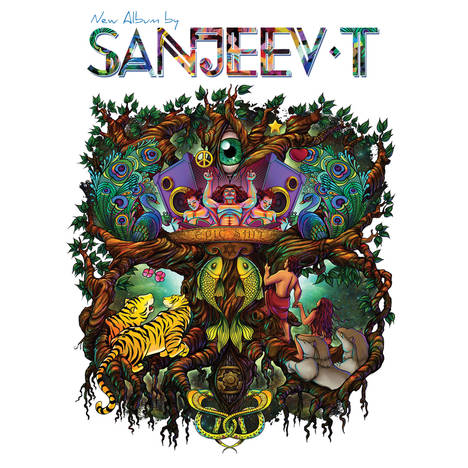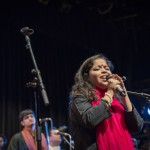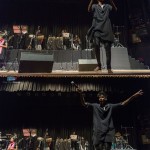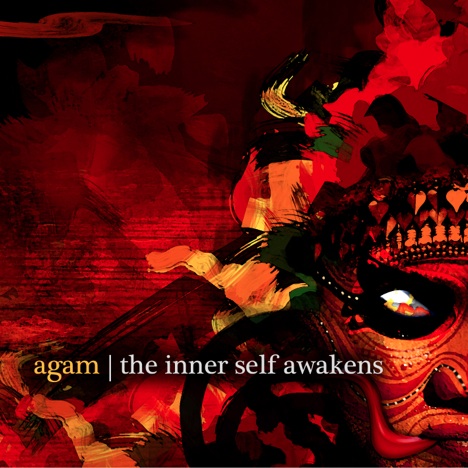
Sanjeev Thomas is one of those talented composers who youve barely heard of but whose music youve been jigging to on a regular basis. Hes been a Bollywood bigwig, lending himself to titles like Jaane Tu Ya Jaane Na, Jhoota Hi Sahi and Rockstar and before all the elitists out there begin to scrunch their noses to dismiss him, it should be told that he plays guitar for A.R. Rahman too. He started out as an independent musician some of his bands include Buddhas Babies and Buddha Blown (five points if you can point out a thematic similarity) and more recently he headed the Chennai-based rock lineup Rainbow Bridge. With the album Epic Shit, Sanjeev T is back to his origins as an independent musician, so dont be expecting a Rahman-style orchestral setup or Bollywood-esque catch-and-throw moments.
Epic Shit is hardly forgettable. The sound production is pristine. With minimal effort on your part, each note impresses itself like an ant burning under a magnifying glass. Technical excellence is all too obvious – this is unsurprising because Baiju Dharmajan has studded the album with his string-play. In the album, Thomas synthesizes the Carnatic sound-laced prog-tones popularized by Motherjane and Avial, and does a solid job of fortifying the genre. However, while an incredibly pleasurably listen, Epic Shit falls a few breaths short of the epicness it claims.
It is not that the songs arent inspired. They each have a clear quality of narration which I find shamefully missing from a substantial portion of contemporary releases. ‘Chekele’ speaks of the adverse conditions of the peasants of Kerala to Baijus exquisite melodic formations and the vocals mix quality which is like a tribute but with a somber aspect. The song, a version of which was also performed by Avial, seems not to lament but rather to exalt the inherent struggle. ‘Electric Pranaam’, definitely my favorite track, features more engaging riffs and rhythmic sequences. An instrumental piece, it reminds one of Baijus Motherjane moments and the beat-boxing injects a refreshingly prog aspect. Asad Khans sitar, though sparingly present is, as usual, invigorating. This is the song I put on repeat precisely because of its examination of the contemporaneity of apparently traditional Indian sounds. An expression of morning respect to the Gods of music, it abounds in variations of count, tempo and consequently, sentiment think movement from serenity to energetic build-up to a sense of reconciliation. ‘Zamzayo’, matches ‘Electric Pranaam’ in ingenuity, but in its lyrical aspect. A song about pride and faith in ones abilities when isolated, it features gems like Curtain calls/She applauds/Fade out slow and .cant find my way/To that shining day. The musical schema is simple but haunting, accentuating the lyrical effect of a pleasing nonchalance towards extraneous concerns a fitting song to shut out the world with.
‘Palli Vaathil’ has an unmatched local scent. A Keralite folk song of Catholic lineage, it retains a lilting, lounge-ish flow that builds into an edge of frenzy. The flute and raging vocals (Sayanora) stand out, but the banjo, though muted, speaks volume of Santhosh Chandrans obvious skill.
When it starts out, ‘Feel Me Now’ has a bit of a Portishead sensibility. Apparently basic lyrics belie a complex thematic understanding. Speaking, or attempting to speak of a collective human perceptibility, a sort of psychological or sentimental core that all human comprehension responds to, the song features a psychedelic musical ethic, peppering it with Warren Mendosas surreptitiously emphatic guitar. Like its topic, the music has a quality that is juxtapositional the quintessential post-Floyd atmospheric tunes mixed with a gentle high synth. To me, ‘Feel Me Now’ requires more than a couple of listens, but it is a memorable track, with a little effort.
‘Mixed Emotions’ is all about sensual appreciation. With the tap guitar skills of Achyuth, it expresses appreciation for individual emotional and intellectual maturity through introspective experience. ‘Purple Lie’ sings along the same vein, but advocates the exploring of the possibilities of an expanded mind an acid trip mashing information and emotion. To me, it isnt entirely farfetched to conceive of this song as a culmination of the exhortations sung of in ‘Mixed Emotions’.
The thing about Epic Shit is that while it seems flawless, it falls short of being awe-inspiring. There are very few moments that make you sit up, take notice, re-wind and try to pick it up. Baijus style is easily discernible, but I prefer him in The Baiju Dharmajan Syndicate or Motherjane. A bit more of Asad Khan and Roop Thomas (Blakc) wouldnt have hurt either. The album ends up being pleasant and entertaining, but needs to tread a few more steps to be considered brilliant.
What does boggle the mind (in a good way, of course) is the album art. Created by a group of artists called Wow Makers, it gives the likes of The Bicycle Days (Calamitunes) and T.L.Mazumdar (BUeC) a run for their money. Intensely symbolic, it visualizes the fusion the album aims at. Nature plus humanity plus an eye of serendipity allows for a plethora of interpretations, much the songs, though I would give the art an edge over the music.
Nonetheless, the album is worth a listen. It epitomizes the burgeoning popularity of Carnatic laced prog and more importantly, is a testament to Sanjeev Ts effort to substantiate the Indian independent music scene. His return to the five-piece band model marks a reversion to personally crafted, un-industrially packaged music that few would chose to take up after continuing financial and commercial success. But even though one would like to hear more of the guitarist rocking Rahmans Mausam and Escape, what counts is Sanjeev Ts return to the heart.













































































